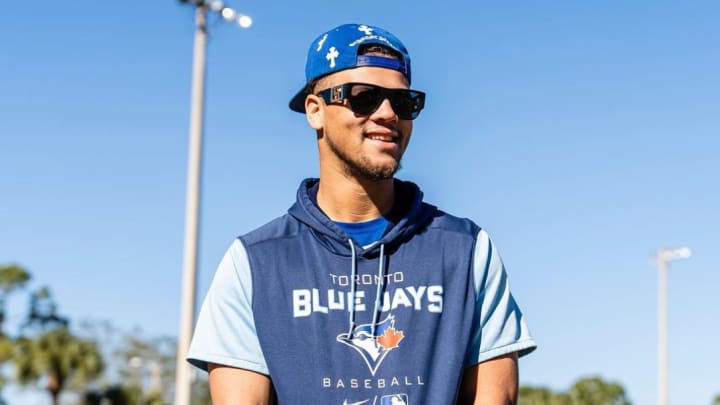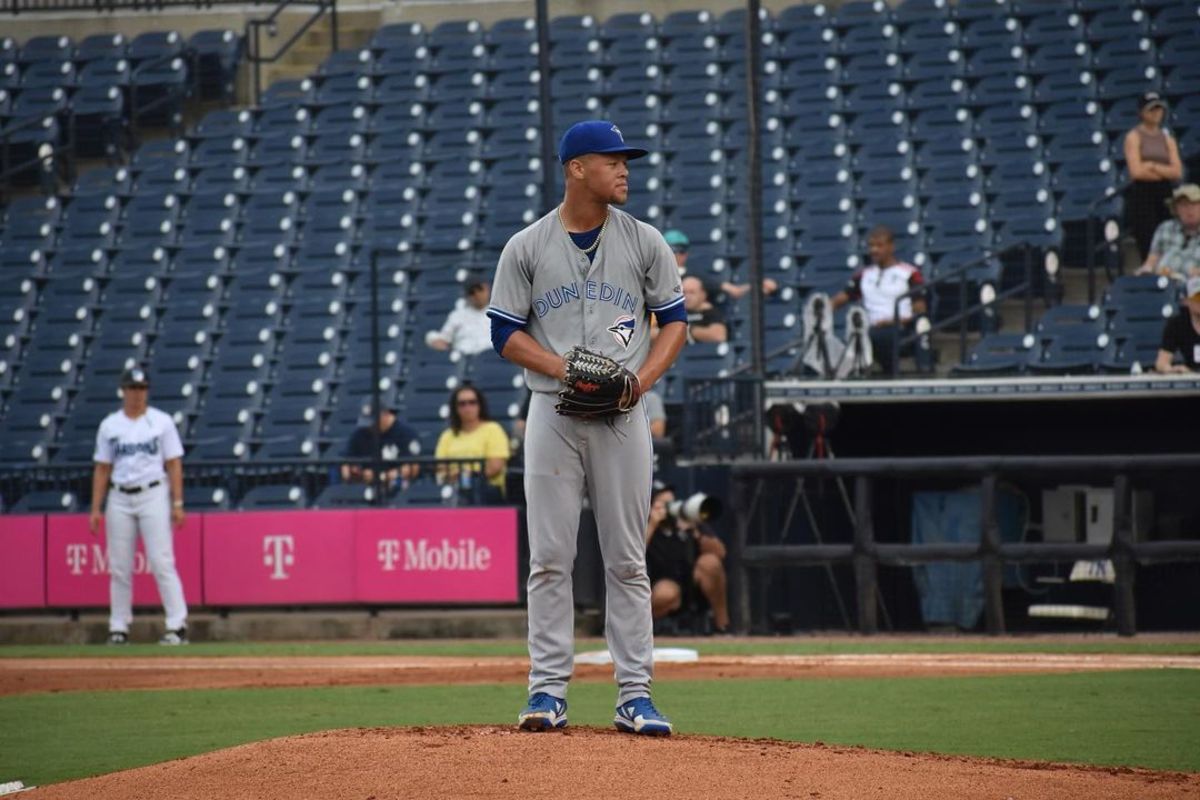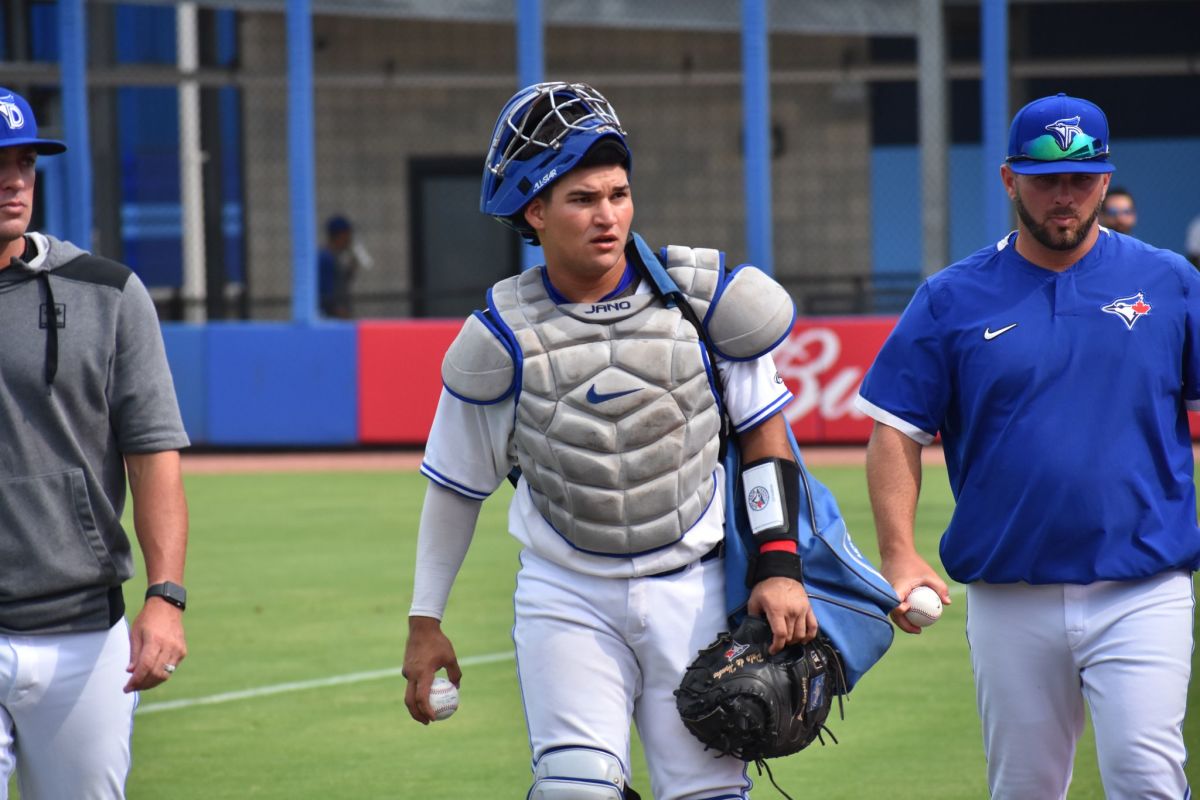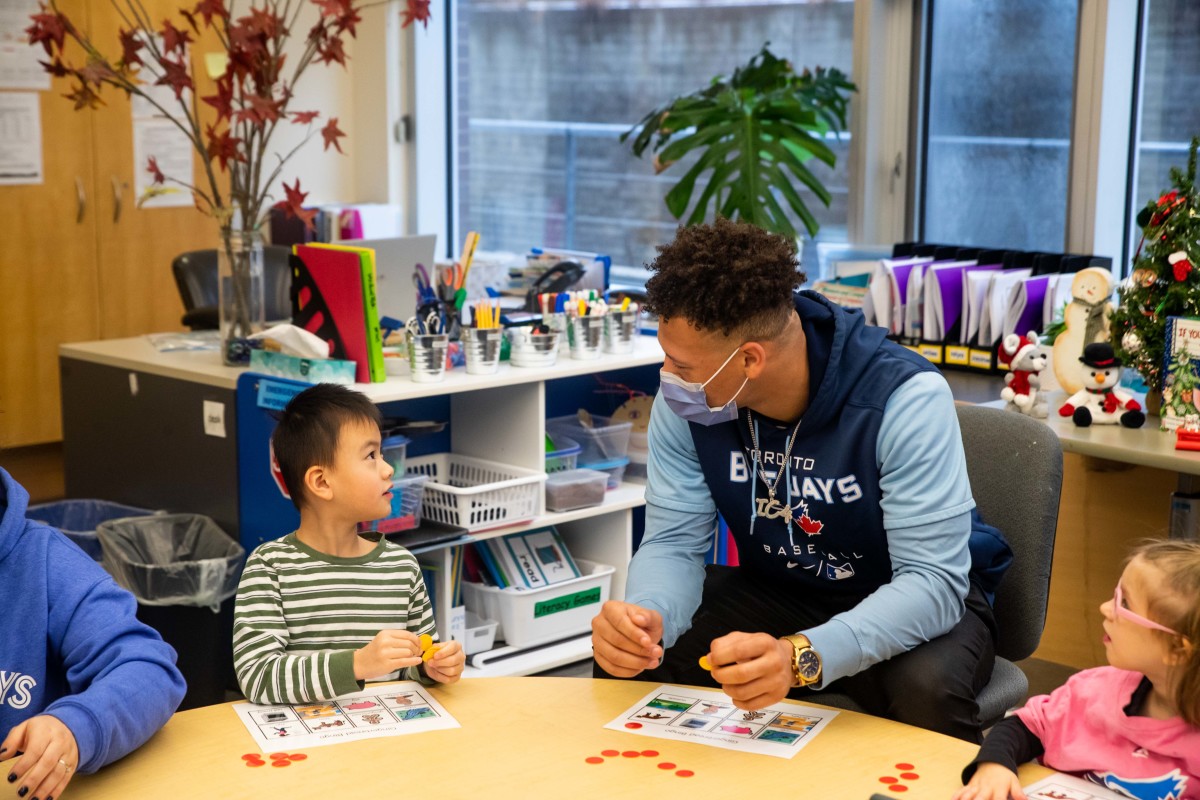Fire and Failure: Blue Jays' Irv Carter Cherishing Baseball's Toughest Tests

IT wasn’t supposed to sting like this. But for Irv Carter IV, each fly ball that cleared the fence or nestled in the gap generated a unique pang of frustration. Never before had the young right-hander felt this way.
June 25, 2022, a Florida Complex League game between the rookie-ball Blue Jays and Detroit Tigers, was a brutal day.
Carter, sporting a 6.14 ERA through two starts, tiptoed his way through two shaky innings before things burst in the third. The rout began with a fly ball over the left-center field wall to add two runs to the board. Then, in the fourth inning, everything collapsed. Four straight hits, including another two-run homer, ended Carter’s day early.
Carter’s final line that Saturday? 11 hits (five for extra bases) over 3.1 innings pitched and five runs allowed.
“Probably the worst game of my career,” the 20-year-old said. “I just got my ass kicked.”
After three starts, Carter’s ERA grew to 8.44, a maddening contrast to the pristine high-school numbers that earned him an $850,000 signing bonus when Toronto picked him in the fifth round of the 2021 draft.
Although Carter didn’t feel like himself, his competitive energy never waned — the savagery on the mound was still there, even if the results weren’t. At that point, locked into his first high-stakes staredown with palpable failure, Carter didn’t fold. He couldn’t fold. The antidote to his struggles on the mound was out there somewhere, and he had to find it.
CARTER started with mechanical changes. He switched from a wind-up to a stretch and fiddled with his arm angle, but the success still didn't come — his fastball velocity was down and he wasn’t attacking the zone with conviction. As the FCL season took a five-day pause in mid-July for the MLB All-Star break, Carter made plans with a longtime mentor of his.
Julio De Paula, a former coach whom Carter refers to as his “trainer,” was near Dunedin with a travel ball team, so the two met up for lunch. The conversation started with a dissection of Carter’s thought process on the mound — what he was thinking between batters; how he was studying film — and it kept going and going and going.
For six hours, De Paula and Carter chatted – that part was normal. Carter said he and De Paula share everything, from financial discussions to updates on the relationships in Carter’s life. They also got a workout in, where Carter modified some pitch grips.
“It was [about] just getting into the meat of the game with someone you feel extremely comfortable with, [someone] who knows you better than anyone else,” Carter said. “It just makes things easier because you know exactly what you have to do to be great.”
Carter has always pursued greatness. And, like all greats, he has a process. To become a stone-cold killer on the hill, he boiled his pre-game recipe down to a sweet science: sinister ‘Halloween’ music, then a towel on his head, then visualization until he sees the face of a lion. But, through a handful of starts, that intensity was working against him. He was burning out.
WHEN Carter returned from the All-Star break, he was paired up with Juan Gonzalez, a defense-first catcher re-assigned from Single A. Gonzalez and Carter, both Florida boys, had crossed paths before.

Gonzalez was familiar with Carter’s full-tilt mentality on the hill, and in the right-hander's first start back, he could tell something was up. Carter was anxious on the hill, firing pitches in and flipping his glove out immediately to demand the ball back for another toss to the plate.
“The game of baseball is about rhythm. It’s all about rhythm,” Gonzalez said. “One-two-three and go. Calm. One-two-three and go.”
As pitches kept missing, the franticness increased. And when the game sped up, Gonzalez knew it was time to step in. Like any good catcher, he knows what makes his pitchers tick and how to motivate them.
“Sometimes, [Carter] feels alone [on the mound],” the 21-year-old backstop said.
It made sense. Carter, all riled up, wanted to punch everyone out. He needed to do it himself, especially if he wanted a promotion to the next minor-league level. So, when the huffing and puffing started, Gonzalez issued some assertive reminders.
His message went like this: “I’m here with you. I have to win this game for you. I’m here to block every f--king ball in the dirt, and we’re gonna call this game so you can be better.”
In that instance, Gonzalez soothed the situation, but the wisdom extended to other aspects of Carter’s game, too. During a pre-game session last summer, Gonzalez noticed how hard his pitcher was chucking his flat-ground warmups.
"Sometimes, Carter feels alone on the mound."
“He was throwing fire at the beginning,” Gonzalez remembered. “I talked to him, and I told him, ‘Bro, can I tell you something?’”
Carter was open, as usual: “You can tell me anything, Juan.”
The two minor-leaguers sat down and talked. At that point, Carter’s routine (armbands, long toss, etc.) took about 10 minutes. Gonzalez explained that was way too fast. The young catcher knew this because he caught Blue Jays starter José Berríos during spring camp.
Berríos, a seven-year MLB veteran, did everything, from long toss to flat-ground throws to the first part of his pre-game bullpen, at half speed, only ramping up for the final few pitches.

Gonzalez wanted Carter to focus on location and repetition before he stepped on the gas.
“You’re literally an artist,” Gonzalez told him. “Up, down, up-and-away, down-and-away – [pitching] with a purpose, with something on your mind.”
It all clicked for Carter – an answer for why that previously hot heater wasn’t popping the mitt like it used to.
“Damn, you're right,” Carter said.
Armed with a refreshed feel for his pitches and a softer, more methodical warmup, Carter felt recharged. He felt freer and more vigorous than before, like he had nothing to lose.
“I wasn’t just gonna put my tail on my butt and walk away,” he said. “I was like, ‘No, okay, you guys got me. You guys got me for a little bit. But just wait until I figure it out.’ And I figured it out.”
A date with the FCL Tigers loomed in early August. Revenge was on Carter’s mind.
An opener handled the first inning, and Carter strolled out for the top of the second frame. He flew into the outing with two strikeouts that inning, two more in the third, and another in the fourth. As the innings whizzed by, the Tigers failed to record a base hit off Carter.
Carter eventually allowed a single in the sixth (though he swears he threw at least one no-hitter in FCL play) and wrapped up his redemption start with five shutout innings, five strikeouts, and one walk. A week later, he diced the Tigers again for nearly an identical line: five innings, no runs, one hit, and six strikeouts.
“I knew what I could do,” Carter said. “And now, me just finally doing that, was like, alright, boom. I got it now.”
"You guys got me for a little bit. But just wait until I figure it out. And I figured it out.”
It was finally time. The Blue Jays promoted Carter to Single A, where he made four starts to finish his first pro season on a high note.
MONTHS removed from his final minor-league start, Carter got a chance to reflect on the entirety of his first pro season. He thought about how he learned how to fail.

“I'm glad that I didn’t learn this lesson in two, three years to come,” Carter said. “I'm glad that I got punched in the mouth as a 19-year-old kid going into pro ball.”
For year two, Carter will equip himself with new resources to fortify his mentality. He already has a mental coach, to whom he talks daily, and a new mantra he drills into his head: Some will. Some won’t. So what? Next.
Indeed, the journey to the big leagues is grueling. Not everyone will make it, but Carter is set on climbing to the top. There will be more failures along the way. The hurt will get worse. But, little things, like base hits or grand slams, don’t bug Carter anymore.
In fact, from now on, Carter will appreciate those low moments even more than the positive ones. He’ll feel the bite and savor the pain. After all, it’s the only way forward.
“You can't evolve if you don’t have any failure. You can't get better if you don't have anything to work towards,” he said. “I'm grateful for every failure I had this year — every single one — because it’s made me that much better of a player and a person.
“It's made me more grateful for the opportunity I have in front of me.”
